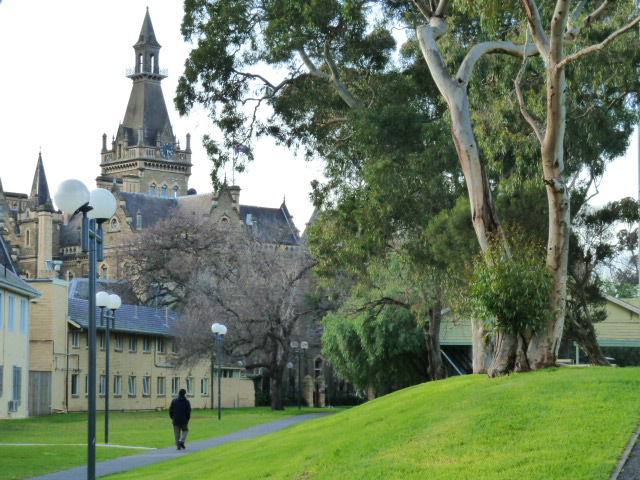WARNING: This article contains discussions about sexual assault and harassment.
[infogram id=”support_services-6″ prefix=”a3e” format=”interactive” title=”support services”]
I spent two of my formative years living with 120 other university students at a residential college. Growing up in regional Victoria, it seemed like the natural step from country life to university, and a convenient way to meet people in an unfamiliar city.
My time living at one of the eleven University of Melbourne colleges was overwhelmingly positive. But in what was largely a friendly and supportive community, sexual harassment occurred, and was an undeniable part of my college experience.
In O-Week during my first year, the college leaders made it clear there would be zero tolerance on sexual assault and harassment. We spoke about, and received several briefings on the issue. But it seemed some didn’t get the message.
As a fresher, I became friends with a few guys in the year above me. I came to trust them. In the second semester of my fresher year, I discovered the group had been placing bets on which of them could sleep with me first.
It sickened me that people who I’d considered my friends regarded me as an object on which they could place bets. I felt embarrassed and uncomfortable, my college experience dampened by the incident.
During my time in college, and the time since, I’ve discovered my situation’s far from uncommon. Sexual assault and harassment seems to be a dark byproduct of living at a university residence, which authorities haven’t yet managed to stamp out.
Colleges a particular area of concern – AHRC report
This month, the Australian Humans Rights Commission released a report into sexual assaults and harassment of university students. More than 30,000 students across Australia were surveyed for the report, the results of which suggest that those living at residential colleges are at a higher risk of being sexually assaulted or harassed than other students.
The report identified residential colleges as a “particular area of concern”. While only seven per cent of the survey’s respondents said they lived at a university residence, this group made up 34 per cent of students who had been assaulted.
[infogram id=”living_arrangements_at_time_of_most_recent_incident_of_sexual_assault_and_harassment” prefix=”LED” format=”interactive” title=”Living arrangements at time of most recent incident of sexual assault and harassment”]The Commission attributed these statistics in part to factors “unique” to the college experience, including hazing and other traditions that the report says provide “opportunities” for sexual assaults and harassment to take place.
“I didn’t feel safe where I lived”

20-year-old Lauren McIntosh is one college student who was sexually harassed while living on campus. (Photo: Kelsey Rettino).
Lauren McIntosh lived at a University of Melbourne college for two years. She was sexually harassed in her second year there.
Lauren tells me after a night out, she came back from having a shower to find a fellow resident in her room. She didn’t invite him there.
“As I walked back into my room, he was standing there in his underwear,” she recalls.
“I asked him what he was doing, and he said something along the lines of that he was getting into bed. I told him to get his stuff and get out.”
While shaken by the incident, Lauren says she didn’t realise the gravity of what had happened until she told her friends.
“I didn’t process it. It was other people who were like ‘that’s not okay’. I thought about it, and then it just hit me,” she says.
“I was scared of him, and angry at him, and didn’t feel safe where I lived.”
Lauren reported the incident to the college, after which her perpetrator was expelled.
“It didn’t happen as quickly as I would have liked,” Lauren says.
“But the biggest thing for me was that I didn’t want it to happen to anyone else.”
“It’s about prevention” – College deputy

Whitley College is one of eleven University of Melbourne colleges. The college says it “apologises unreservedly” to people sexually assaulted or harassed “who felt like they couldn’t speak up”. (Photo: Kelsey Rettino)
The Heads of the eleven University of Melbourne colleges have responded to the Australian Human Rights Commission’s report. In a joint statement, they stress that while the colleges have been working to improve how they address sexual assault and harassment, there’s still “more to do”.
Genevieve Leach is the Deputy Warden and Head of Pastoral Care and Wellbeing at Whitley College. She says the University of Melbourne Colleges meet regularly and have developed shared Fair Treatment policy and procedures to address the issue.
“The colleges of Melbourne University have been very proactive in the last couple of years,” she says.
“We know there are still some practices that go underground at some colleges… [but] we are committed to acting upon the report, there’s no question about that.”
Lauren says it’s important that colleges make their sexual assault and harassment policies clear from orientation week, when new students take up residence at the colleges.
The University of Melbourne colleges say this is what they’re doing. This year, the colleges provided training to O-Week leaders in an effort to prevent instances of sexual harassment and assault.
“One of the things we’ve introduced this year for O-Week leaders across all of the colleges is consent training, by-stander training, and safe partying training,” Genevieve says.
“At Whitley, we did the same with all of our new students, and had external and internal people training them.”
“It’s absolutely about prevention – prevention, education and appropriate response is what we’ve got to do.”



[…] To view the full story, click here. […]